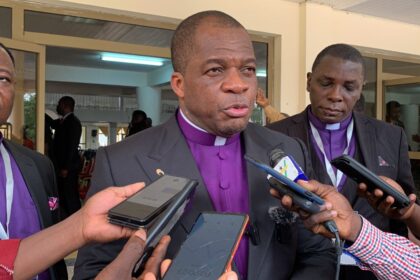Defence Chiefs from the Economic Community of West African States (ECOWAS) last Thursday converged on Abuja to discuss the proposed $2.6 billion budget for activating the subregion Standby Force.
The Standby Force is meant to contain terrorism and unconstitutional change of government with the region planning to deploy a 5,000-strong “Standby Force” to fight the region’s worsening security crises, a measure that analysts say might not work due to challenges of funding and division within the regional bloc.
The plan, which will cost $2.6 billion annually, was also aimed at preventing further coups following a string of military takeovers destabilising the region, Nigeria’s Defence Minister, Mohammed Badaru, said during the meeting.
Resurgence of coups
The resurgence of coups in West and Central Africa – with four of its nations being run by military governments – has divided the 15-nation ECOWAS and destabilised the region, especially the coup-hit countries of Mali, Burkina Faso and Niger, which are worst-hit by the deadly violence now spreading to coastal nations.
Thursday’s meeting is the first time the bloc is mapping out publicly the financing of its long-talked-about standby force. However, analysts identified challenges it might face, including the shortage of funds from member states required to contribute money and securing the support of coup-hit countries most affected by the security crises.
It is clear as the 15-nation bloc summoned its defence chiefs to discuss its threat to “take all measures necessary (that) may include the use of force” if ousted Nigerien President, Mohamed Bazoum, is not reinstated within one week.
Military force
ECOWAS is resolved to use military force after economic and travel sanctions used against the coup plotters failed, according to a Western diplomat in Niamey who did not want to be identified for security reasons.
How the bloc would carry out its threat remains unclear given its lack of coordination in providing security regionally and formally with the US State Department in Niger, said Aneliese Bernard, director of Strategic Stabilization Advisors.
“More than ever, we are at a pivotal moment in the history of our community to address insecurity,” said Omar Alieu Touray, president of the regional bloc of ECOWAS Commission, as he urged member-states to support the force. Their proposals are expected to be considered at the upcoming summit of the regional heads of state.
ECOWAS has unsuccessfully tried to return democracies in these countries. Their best shot with now-lifted economic sanctions which resulted in the three coup-hit countries withdrawing their membership and opening more windows for Russian mercenaries in the region.
Insecurity
The West African sub-region is threatened by insecurity and grave humanitarian challenges. Terrorism and violent extremism have continued to threaten its collective existence. The cross-border free movement and activities of terrorist groups in the sub-region are also deepening its internal security challenges.
To address these challenges, the Authority of ECOWAS Heads of State and Government at its 62nd Ordinary Session held in Abuja, on December 4, 2022, instructed the Committee of Chiefs of Defence Staff to urgently study and propose the options, modalities, financial and technical means for the urgent operationalisation of the ECOWAS Standby Force, including a special kinetic operations to combat terrorism.
“As part of the implementation of these decisions, the Committee of Chiefs of Defence Staff met twice to deliberate and come up with recommendations, which was subsequently presented to the 50th meeting of the Mediation and Security Council at the ministerial level on July 5, 2023, in Bissau.
ECOWAS Commission
President of the ECOWAS Commission, Omar Alliou Touray, said the move became necessary as the region had become the epicentre of terrorism.
“Our gathering here today is driven by the urgent need to consider the financing options in the memorandum to be presented by the ECOWAS Commission for deploying the proposed regional force. The financial implications of these proposals are significant.
“The overall estimated cost is $2,606,695,640 per year for a brigade of 5,000 men. The alternative proposal is for a brigade of 1,650 men, with an estimated annual cost of $481,459,335. These figures underscore the gravity of the task before us and the necessity of a robust and sustainable resource mobilisation strategy.
Touray decried the damages caused to the region by terrorism, which include the large scale of Internally Displaced Persons, loss of territories and a quarter of all deaths from terrorist attacks occurring globally were in Burkina Faso, while Mali is ranked number three most impacted country.
Transborder menace
“Taking due consideration of the transborder nature of the menace and the need to address it collectively and in line with the directive by the Authority on Peace and Security Matters, I would like to inform this August body that the invitation to this meeting was extended to all the 15 ECOWAS member states”.
“That is why we have invited all 15 member states to attend this crucial meeting. Honourable Ministers, we have an urgent task to mobilise the financial resources to fund our Regional Action Plan against terrorism.
The Commission will present the second document, which is a memorandum proposing modalities for the mobilisation of internal, financial, human, and material resources on a mandatory basis to support the deployment, and the development of the regional counterterrorism force as defined by the Committee of Chiefs of Defence Staff.
Explore the world of impactful news with CitiNewsroom on WhatsApp!
Click on the link to join the Citi Newsroom channel for curated, meaningful stories tailored just for YOU: https://whatsapp.com/channel/0029VaCYzPRAYlUPudDDe53x
No spams, just the stories that truly matter! #StayInformed #CitiNewsroom #CNRDigital
The post ECOWAS defence chiefs propose $2.6bn budget to establish standby force appeared first on Citinewsroom – Comprehensive News in Ghana.





